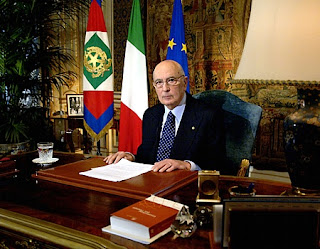I arrived
here in Italy
on Friday. By that day, Pierluigi Bersani, leader of the left coalition, had
already given up and had told Giorgio Napolitano, President of the Republic,
that he was unable to form a government as he did not receive enough support in
Parliament. Napolitano had indeed asked him to find out whether he had a
majority; if he did, he would have become PM. But that attempt led to a stall.
Bersani tried to persuade Beppe Grillo's Five Star Movement to support a
potential left government, but all he got from Grillo were swear words.
Meanwhile, Berlusconi's party called for a government "of broad
agreements", which means a coalition of the main leftwing party and the
main rightwing party. But Bersani immediately said no to that. On the other
hand, Grillo called for a Five Star Movement government, but this option was
never taken seriously by the President.
So, since
nobody had been able to find a solution, it was again Napolitano's turn. On Friday
night, the situation was so chaotic and looking so desperate, that the media
started to talk about the possibility of Napolitano's resignation.
President of the Republic Giorgio Napolitano
The
President, who is elected by parliament since Italy is a parliamentary system, is on a seven-years mandate. During those seven-years, he normally has the power
to dissolve parliament. So, generally speaking, the President could simply say
"Let's have another election". But this is where things get even more
complicated: Napolitano is coming to the end of his mandate, which is due in
May 2013, and during the last months of office a President is in the so called
"white semester". In the "white semester", a President's
powers are more limited, and he cannot, among the others, dissolve parliament. This
is why on Friday night the media was hypothesising an early end to Napolitano's mandate: in
other words, before forming the government, the parliament would have chosen
the new President, who then would have been able to call for a new election.
All I could think while listening to the news was "First the Pope, then
Napolitano?!".
But this is
not what happened. After what I am assuming was the longest night of his life,
Napolitano announced on Saturday morning that we was going to stay in office
until the very end, because he could at least try "to create more
favourable conditions" for future decisions.
This is
what the President decided: Mario Monti, the appointed technocratic PM, remains
in office with his cabinet (Monti indeed spontaneously resigned, but was never
formally voted down by parliament);
Napolitano then appointed two special commissions whose task is to come up with
"programmatic proposals of institutional-social and economic
character", which, ideally, should be approved by all parties. My
understanding is that Monti's government and these commissions should remain in
power at least until the new President is elected, then, possibly, we might
vote again.
While I
think that Napolitano was able to find a temporary solution which saved Italy from
another poor figure (as his resignation would undoubtedly have been), I am
appalled by some of the people that he appointed among those "ten wise
men" who are supposed to perform some sort of miracle. Apart the fact that
they are all men (really? Not even a wise woman in Italy?) and aged 70 or more, virtually all of them are representatives
of the old ruling class, even though not all of them are politicians. To me,
they look very unlikely to bring about any real change.
Here is a
list of the "ten wise men":
-Prof Valerio Onida - University of Milan constitutional law expert-Luciano Volante - former parliament speaker from Pier Luigi Bersani's party
-Mario Mauro - senator in Mario Monti's party
-Gaetano Quagliariello - senator in Silvio Berlusconi's party
-Prof Enrico Giovannini - statistics agency ISTAT head
-Giovanni Pitruzzella - Market Competition Authority head
-Salvatore Rossi - Bank of Italy deputy head
-Enzo Moavero Milanesi - European Affairs minister
-Giancarlo Giorgetti and Filippo Bubbico - parliament commission heads
BBC article: http://www.bbc.co.uk/news/world-europe-21981679

